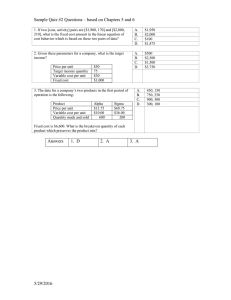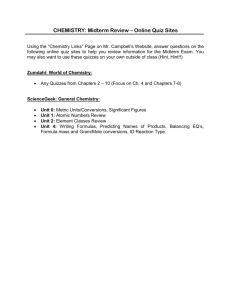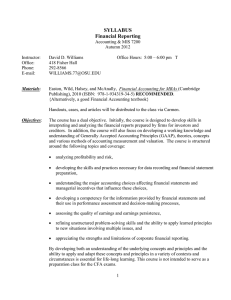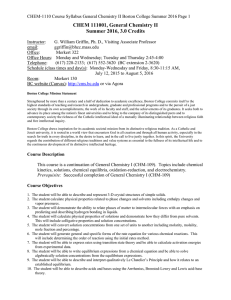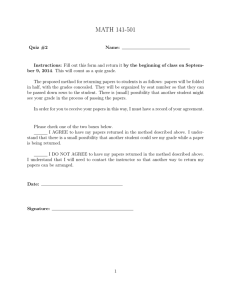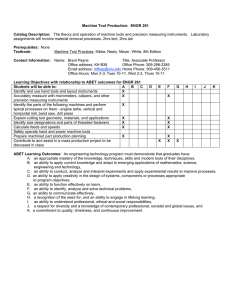CHEM 110901, General Chemistry I Summer 2016, 3.0 Credits
advertisement
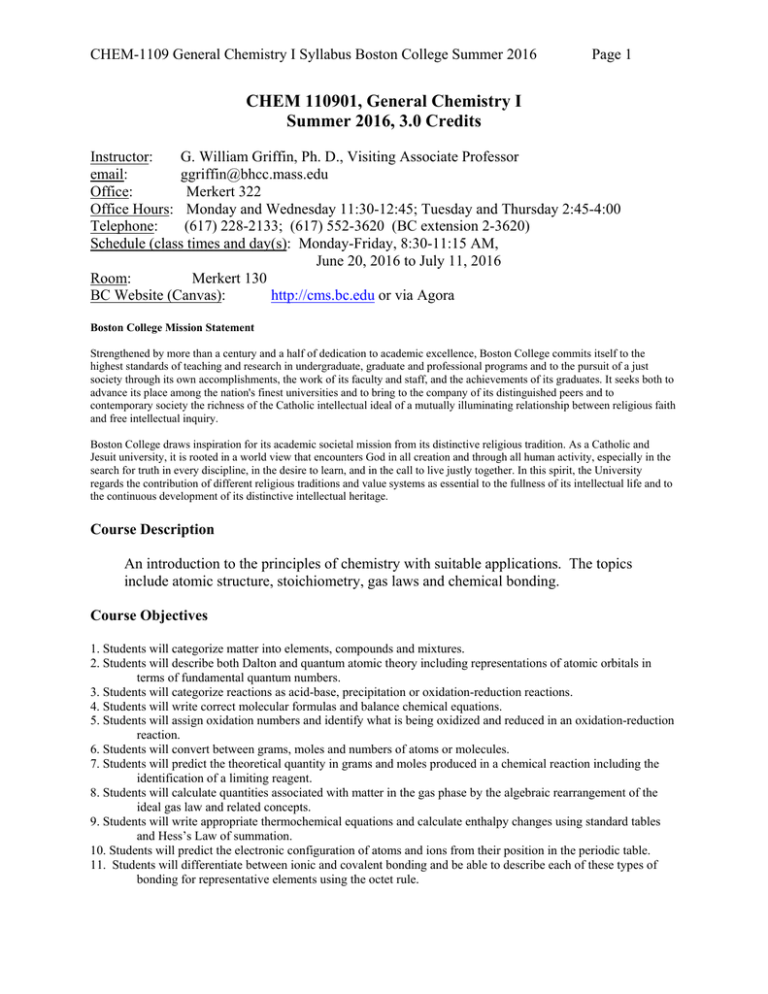
CHEM-1109 General Chemistry I Syllabus Boston College Summer 2016 Page 1 CHEM 110901, General Chemistry I Summer 2016, 3.0 Credits Instructor: G. William Griffin, Ph. D., Visiting Associate Professor email: ggriffin@bhcc.mass.edu Office: Merkert 322 Office Hours: Monday and Wednesday 11:30-12:45; Tuesday and Thursday 2:45-4:00 Telephone: (617) 228-2133; (617) 552-3620 (BC extension 2-3620) Schedule (class times and day(s): Monday-Friday, 8:30-11:15 AM, June 20, 2016 to July 11, 2016 Room: Merkert 130 BC Website (Canvas): http://cms.bc.edu or via Agora Boston College Mission Statement Strengthened by more than a century and a half of dedication to academic excellence, Boston College commits itself to the highest standards of teaching and research in undergraduate, graduate and professional programs and to the pursuit of a just society through its own accomplishments, the work of its faculty and staff, and the achievements of its graduates. It seeks both to advance its place among the nation's finest universities and to bring to the company of its distinguished peers and to contemporary society the richness of the Catholic intellectual ideal of a mutually illuminating relationship between religious faith and free intellectual inquiry. Boston College draws inspiration for its academic societal mission from its distinctive religious tradition. As a Catholic and Jesuit university, it is rooted in a world view that encounters God in all creation and through all human activity, especially in the search for truth in every discipline, in the desire to learn, and in the call to live justly together. In this spirit, the University regards the contribution of different religious traditions and value systems as essential to the fullness of its intellectual life and to the continuous development of its distinctive intellectual heritage. Course Description An introduction to the principles of chemistry with suitable applications. The topics include atomic structure, stoichiometry, gas laws and chemical bonding. Course Objectives 1. Students will categorize matter into elements, compounds and mixtures. 2. Students will describe both Dalton and quantum atomic theory including representations of atomic orbitals in terms of fundamental quantum numbers. 3. Students will categorize reactions as acid-base, precipitation or oxidation-reduction reactions. 4. Students will write correct molecular formulas and balance chemical equations. 5. Students will assign oxidation numbers and identify what is being oxidized and reduced in an oxidation-reduction reaction. 6. Students will convert between grams, moles and numbers of atoms or molecules. 7. Students will predict the theoretical quantity in grams and moles produced in a chemical reaction including the identification of a limiting reagent. 8. Students will calculate quantities associated with matter in the gas phase by the algebraic rearrangement of the ideal gas law and related concepts. 9. Students will write appropriate thermochemical equations and calculate enthalpy changes using standard tables and Hess’s Law of summation. 10. Students will predict the electronic configuration of atoms and ions from their position in the periodic table. 11. Students will differentiate between ionic and covalent bonding and be able to describe each of these types of bonding for representative elements using the octet rule. CHEM-1109 General Chemistry I Syllabus Boston College Summer 2016 Page 2 12. Students will describe electronegativity and interpret how electronegativity differences between atoms affect chemical bonding patterns including ionic vs. covalent bonding as well as polar vs. non-polar bonds. 13. Students will generate acceptable Lewis structures from a molecular formula and predict molecular geometry using the VSEPR model. 14. Students will predict the direction and magnitude of dipole moments based on bonding patterns and molecular geometry. 15. Students will explain covalent bonding using valence bond and molecular orbital models. 16. Students will predict the hybridization of atoms (valence bond model) in structures and chemical formulas. Grading Quizzes (two scores dropped) Homework (one score dropped) Hour Exam I (6/27/16) Hour Exam II (7/5/16) Final Exam (7/11/16) 10% 10% 22% 22% 36% (Chapters 1-4) (Chapters 5-8) (Chapters 1-10) No “extra work” (research papers, laboratory investigations, independent study, etc.) will be accepted to replace coursework in the categories listed above. Only electronic calculators are allowed for examinations and quizzes. Cell phones, PDAs, computers, portable media players, tablets, translators and any other devices capable of texting or internet connection and/or playing audio or video electronic files are not allowed for support on exams and quizzes. Summer Grading System The undergraduate grading system consists of twelve categories: A (4.00), A- (3.67), excellent; B+ (3.33), B (3.00), B- (2.67), good; C+ (2.33), C (2.00), C- (l.67), satisfactory; D+ (l.33), D (l.00), D- (.67), passing but unsatisfactory; F (.00), failure; I (.00), incomplete; F (.00), course dropped without notifying office; W (.00), official withdrawal from course. The graduate grading system is A (4.00), A- (3.67), Excellent; B+ (3.33), B (3.00), good; B- (2.67), C (2.00), passing but not for degree credit; F (.00), failure. Grade Reports. All students are required to log into the web through Agora to access their summer grades. Students must utilize their BC username and password to log on. If your username or password is not known, the HELP Desk located in the Campus Technology Resource Center (CTRC) in O’Neill Library will issue a new one. The CTRC requires a valid picture ID (a BC ID, driver’s license or passport) to obtain your password. Text(s)/Readings (Required) th Chemistry, 12 Edition, Raymond Chang and Kenneth Goldsby, McGraw Hill, (2015) ISBN: 978-0078021510 Text(s)/Readings (Recommended) Student Solutions Manual (for Chang text), McGraw Hill, (2015) ISBN 13: 9781259683367 (978-1-259-68336-7) ISBN: 1259683362 (1-259-68336-2) Important Policies http://www.bc.edu/content/bc/schools/advstudies/guide/academicinteg.html Written Work Graduate and undergraduate students are expected to prepare professional, polished written work. Written materials must be typed in the format required by your instructor. Strive for a thorough, yet concise style. Cite literature appropriately, using APA, MLA, CLA format per instructors decision. Develop your thoughts fully, clearly, logically and specifically. Proofread all materials to ensure the use of proper grammar, punctuation, and spelling. You are encouraged to make use of campus resources for refining writing skills as needed [http://www.bc.edu/libraries/help/tutoring.html]. CHEM-1109 General Chemistry I Syllabus Boston College Summer 2016 Page 3 Scholarship and Academic Integrity It is expected that students will produce original work and cite references appropriately. Failure to reference properly is plagiarism. Scholastic dishonesty includes, but is not necessarily limited to, plagiarism, fabrication, facilitating academic dishonesty, cheating on examinations or assignments, and submitting the same paper or substantially similar papers to meet the requirements of more than one course without seeking permission of all instructors concerned. Scholastic misconduct may also involve, but is not necessarily limited to, acts that violate the rights of other students, such as depriving another student of course materials or interfering with another student’s work. Use of Electronic Devices The use of cell phones, computers, tables and other electronic devices are allowed during lectures sessions but should not be a distraction for other students or the instructor. Cell phones are expected to have ringers set to a low volume or on vibrate and conversations should be conducted outside the classroom when the class is in session. During exams and quizzes only the reference materials provided by the instructor and a calculator can be used. The use of any other electronic devices including but not limited to cell phones, tablets and portable media players is expressly forbidden and may result in a decreased score or a grade of zero for the quiz or exam at the instructor’s discretion. Request for Accommodations If you have a disability and will be requesting accommodations for this course, please register with either Dr. Kathy Duggan (dugganka@bc.edu), Associate Director, Connors Family Learning Center (learning disabilities or AHD) or Dean Paulette Durrett, (paulette.durrett@bc.edu), Assistant Dean for students with disabilities, (all other disabilities). Advance notice and appropriate documentation are required for accommodations. http://www.bc.edu/content/bc/libraries/help/tutoring/specialservices.html. Attendance Class attendance is an important component of learning. Students are expected to attend all classes and to arrive by the beginning of and remain for the entire class period. When an occasion occurs that prevents a student from attending class, it is the student’s obligation to inform the instructor of the conflict before the class meets. The student is still expected to meet all assignment deadlines. If a student knows that he or she will be absent on a particular day, the student is responsible for seeing the instructor beforehand to obtain the assignments for that day. If a student misses a class, he or she is responsible for making up the work by obtaining a classmate's notes and handouts and turning in any assignments due. Furthermore, many instructors give points for participation in class. If you miss class, you cannot make up participation points associated with that class. Types of absences that are not typically excused include weddings, showers, vacations, birthday parties, graduations, etc. Additional assignments, penalties and correctives are at the discretion of the instructor. If circumstances necessitate excessive absence from class, the student should consider withdrawing from the class. In all cases, students are expected to accept the decision of the instructor regarding attendance policies specific to the class. Consistent with our commitment of creating an academic community that is respectful of and welcoming to persons of differing backgrounds, we believe that every reasonable effort should be made to allow members of the university community to observe their religious holidays without jeopardizing the fulfillment of their academic obligations. It is the responsibility of students to review course syllabi as soon as they are distributed and to consult the faculty member promptly regarding any possible conflicts with observed religious holidays. If asked, the student should provide accurate information about the obligations entailed in the observance of that particular holiday. However, it is the responsibility of the student to complete any and all class requirements for days that are missed due to conflicts due to religious holidays. There may be circumstances that necessitate a departure from this policy. Feel free to contact the Summer Session Office at 617552-3800 for consultation. CHEM-1109 General Chemistry I Syllabus Boston College Summer 2016 Deadlines: Page 4 Assignments are due at the beginning of the class period on the specified dates. Late assignments will be graded accordingly. Make-up Policy: One hour examination can be made up if the student notifies the instructor by voicemail or e-mail prior to the exam time and has a credible reason for absence from the exam (sickness, etc.). Make-up examinations do not contain extra credit and are assigned a point value of 100 points total. Examinations missed without notifying the instructor prior to the exam time will not be eligible for make-up and will be scored as a zero. Verifiable documentation must accompany requests for make-up of the final or more than one hour examination. All make-up examinations may be recorded at a discounted value (less than 100 points) at the instructor’s discretion. There is no make-up for quizzes since two scores are dropped. Late homework assignments receive less than full credit as described below. Course Assignments (readings, exercises and/or experiences) Examinations: There will be two hour examinations and a final examination which is cumulative but will emphasize information from the last part of the course not covered in the other hour examinations (scored as 100 points each but exams will normally have at least 5 points of extra credit). Quizzes: Quizzes will be administered at the start of the class in all lecture sessions which do not immediately follow an examination and will reflect the topics covered the previous day. The two lowest quiz scores will be dropped (30 points each). No additional time will be provided students who come to class late for the quiz. As for exams students who require any special accommodations must provide written documentation prior to the first quiz taken. Homework: Homework will be graded for effort and punctuality only. In both cases the assignments are normally due at the class break time (around 9:45 AM) although they may be collected at the end of the lecture period. Assignments received on time and showing reasonable effort will receive full credit. Late or incomplete assignments will receive less than full credit or a zero at the instructor’s discretion. (1.0 point each) Time commitment: Students will have to spend a significant amount of preparation time in addition to the contact time especially in this compressed format course. Students should be prepared to dedicate at least 3 hours per lecture day for reading and homework assignments. Computer support: The BC Canvas site (http://cms.bc.edu) as well as the internet address https://docs.google.com/folder/d/0B2_Fr-8JMMzzeG5WMGlXaUFGOE0/edit has electronic copies of all of the lecture notes, syllabus and HW assignments (in MS Word or pdf format) as well as useful internet links. The BC site should have powerpoint slides for the entire class as well as an exam/quiz file of former exams and quizzes with corresponding answer keys. The BC site will also have HW assignment answer keys available after the due date for each assignment. Reserve materials: A copy of the textbook and companion Solutions Manual and Study Guide are on reserve. A copy of Ebbing and Gammons’ General Chemistry 8th Ed. is also available in the library as an extra source of problems. CHEM-1109 General Chemistry I Syllabus Boston College Summer 2016 Page 5 General Chemistry I (CHEM 110901) Tentative Course Schedule (Summer 2015) Prof. G. William Griffin (Tel: 617-552-3620; 617-228-2133 e-mail: ggriffin@bhcc.mass.edu) Monday Tuesday Wednesday Thursday June 20 Introduction Chapter 1 21 Chapter 2 Quiz 1 22 Chapter 3 Quiz 2 23 Chapter 3,4 Quiz 3 June 27 28 Chapter 5 29 Chapter 6 Quiz 5 30 Chapter 7 Quiz 6 5 6 Chapter 9 7 Chapter 10 Quiz 8 EXAM I (Chapters 1-4) July 4 NO CLASS (Holdiay) July 11 FINAL EXAM (Chapters 1-10) EXAM II (Chapters 5-8) Friday 24 Chapter 4 and 18.1 Quiz 4 July 1 Chapter 8 Quiz 7 8 NO CLASS (Tentative; either 7/1/16 or 7 /5/16) General Chemistry II CH-110 7/12/16 to 8/5/16 M, Tu, W, F 8:30-11:15 AM (No classes on Thursdays) Date June 20 June 21 June 22-23 June 23-24 Lecture Topics Introduction and Measurement (Chapter 1) Atomic Structure (Chapter 2) Chemical Formulas, Equations and Molar Relationships (Chapter 3) Stoichiometry and Aqueous Reactions (Chapter 4 also Section18.1) June 27, 2016 Hour Examination I (Chapters 1-4 and redox reaction balancing) June 28 Gas Laws (Chapter 5) June 29 Thermochemistry (Chapter 6) June 30 July 1 Quantum Chemistry (Chapter 7) Electronic configuration/Periodicity (Chapter 8) July 4 July 5 Holiday (NO CLASS) Hour Examination II (Chapters 5-8) June 6 July 7 July 8 Ionic and Covalent Bonding (Chapter 9) Molecular Geometry and Bonding Theory (Chapter 10) Tentatively NO CLASS but can be changed to 7/1/16 or 7/5/16 by class vote on 6/21/16 July 11 FINAL EXAMINATION (Chapters 1-10)
